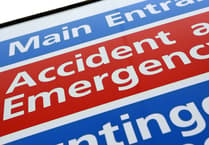Fewer people died in non-fire incidents attended by crews in Hampshire and the Isle of Wight last year, new figures show.
The Fire Brigades Union, which represents firefighters, said staff are having to go above and beyond, responding to emergencies beyond fires daily – and urged the Government to provide "urgent funding and proper resourcing".
Home Office figures show 80 people were killed in non-fire incidents attended by the Hampshire Fire and Rescue Service in the year to March 2022 – down from 82 the year before.
Across England, there were 3,300 non-fire fatalities last year – a 20% increase on 2020-21 and the third-highest number since records began.
In 2019-20, the last full year before the coronavirus pandemic, 2,600 people died in non-fire incidents.
Meanwhile, the total number of non-fire incidents attended by fire and rescue services nationally rose by 29% to a record 195,000 last year – including 4,451 in Hampshire and the Isle of Wight.
Non-fire incidents attended by fire and rescue services can include flooding, traffic collisions, suicide attempts and issues affecting entry and exit into buildings.
Matt Wrack, general secretary of the FBU, said: "Firefighters and control staff are there for communities in times of need, responding to emergencies beyond fires every day."
Mr Wrack said firefighters are also now on the front line of the climate crisis, attending incidents of flooding, heatwaves and wildfires.
The figures show fire services attended 16,000 flooding incidents across the country in 2021-22 – up from 14,900 the year before and the most since 2012-13.
They led to a record 141 fatalities, up 40% from the previous year.
In Hampshire and the Isle of Wight, 132 flooding incidents resulted in one deaths in the year to March 2022.
"Despite firefighters being increasingly relied upon to go above and beyond to save lives and property, resources are being cut to the bone," Mr Wrack added.
"One in five jobs have been lost since 2010, meaning 11,500 fewer firefighters able to respond to increasing callouts, and working conditions are worsening, with yet another pay cut being imposed by the Government and fire bosses.
"It’s clear that our fire and rescue service, which we all rely on, needs urgent funding and proper resourcing now."
The FBU announced more than 80% of its members have voted in favour of nationwide strike action for the first time since 2003 after rejecting an earlier 5% pay rise offer.
The union said the vote on industrial action follows more than a decade of real-terms pay cuts.




